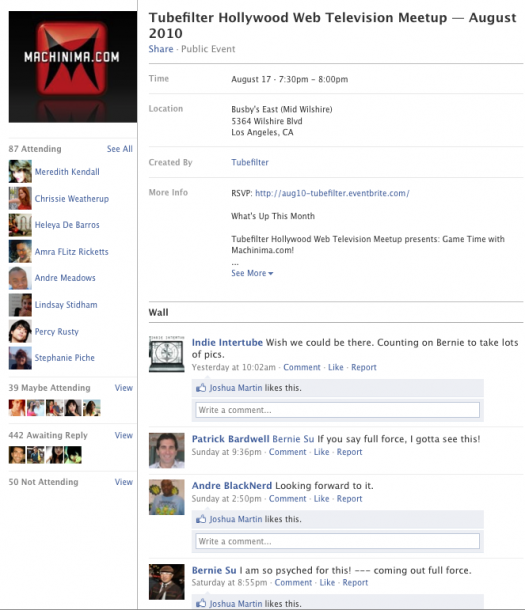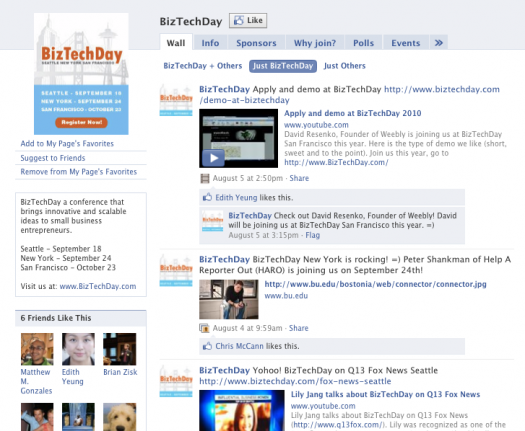The post 5 ways to use social media to build a crowd for your event appeared first on Socialbrite.
]]>
Target audience: Nonprofits, cause and community organizations, foundations, NGOs, businesses, brands, government agencies, conference organizers, educators. First of two parts. Also see part 2: Using Twitter & LinkedIn to promote your event.
Guest post by Tamara Mendelsohn
Director of Marketing, Eventbrite
We often get asked, “How can I leverage social media to promote my event?” So we started collecting best practices from event organizers who use Eventbrite and pulled them into this post to help you get started down the path to social media glory.
It’s important to note that social media is a clunky gun — it’s a channel, not a strategy. The best way for each event to utilize this channel will vary depending on who the target audience is and how they engage online.
Social media: the perfect tool to generate buzz
It’s no silver bullet. That said, social media can be an incredibly powerful promotional tool, allowing you to reach more of the people who care about and ultimately want to attend your event. When people share information about your event with their network, that message carries much more weight than a traditional ad. It’s a personal endorsement of your event. Social media is also the perfect tool to generate buzz, to get people talking about your event in a recorded fashion where others can stumble across it and get caught up in it, too. It’s not a new phenomenon. That’s how people have promoted their events from the beginning: get people talking about it. What social media brings is the ability for anyone to discover the chatter, giving it far more reach and power.
But it can be a game-changer. We’ve built a lot of features into Eventbrite to support sharing of events through social media and we see the results every day. Facebook is the greatest driver of traffic to our site, which means people are sharing your events on Facebook, their friends are seeing the posts show up in their feed, and they are clicking on the links that bring them back to your Eventbrite event page. That’s really exciting, and I hope you can see the powerful implications that it has on the way events are promoted and discovered.
Some guiding principles on promoting events
Choose the platforms that make sense for your event.
1There are a few options when it comes to promoting your event through social media, and each has advantages and disadvantages. For example, Facebook and LinkedIn show who’s attending and they aggregate conversations about the event in one place, while Twitter provides the opportunity for anyone to discover the event. Building your own social network around your event may be the thing to do if you have an appetite for building a richly branded online experience, but it won’t give you the virality of established social networks. Look to strike a balance across several platforms. Most important, understand where your target audience is already engaging. Identify existing communities by searching on LinkedIn, Facebook, or other forums, monitor Twitter conversation, and locate the platforms that have the most activity. This is where you’ll want to place the majority of your efforts.
Define success metrics and don’t underestimate the effort required.
2To new users, online communities might look self-sustaining. They’re not. Facebook, Twitter and the rest all take work, ideally in the form of a dedicated individual who can keep dialogue flowing and seed productive conversations. Continuous new content and engagement tactics are required to grow the vibrant community necessary for achieving buzz around your event. Define success metrics so that you know how you’re tracking — number of fans or followers is a great place to start, but engagement metrics are most important. The Facebook Page dashboard gives good stats and there are some great free Twitter analytics tools (we use Twitalyzer) that can measure engagement levels of your tweets.
Use Facebook to create a destination for engagement
Publish your event to Facebook.
3From right within the Eventbrite management console you can publish your event to Facebook, and it will automatically create a Facebook Event, pulling in all the event details from Eventbrite. You can publish the event as a stand-alone event created by your Facebook profile or as an event associated with a specific fan page. Facebook Events allow you to easily invite your friends and fans and it makes it easy for them to share with their friends. It creates a central location for attendees to begin to connect and share their excitement for the event.

Create a Facebook Page.
4For larger events a dedicated page may be appropriate as a central location to engage with attendees and people interested in learning more about your event. The best pages that we’ve seen post updates almost daily, giving fans a window into the planning process of the event. Have you just secured an amazing caterer? Has an exciting speaker agreed to attend? Has the event received coverage in the media? Multimedia is always compelling: If you can share photos of the space or get the main attractions (speakers, artists, etc.) to post quick videos on their thoughts for the event, it really helps to bring it to life. Your Facebook Page is not only a great way to get your attendees excited but also to get them involved in the event itself by asking them questions that can influence the content or the agenda.

Invite friends and fans to attend and help spread the word.
5Search Facebook for other Pages on topics related to your event and engage with the users there. Like that page and you can then write things on their wall. I would carefully craft your message so that it doesn’t look like spam (people react very negatively to spam), letting people know about the event and why they should attend. Include a link to the Eventbrite page or the Facebook event when you post so users can click through for more content if they are interested. For example, a benefit concert featuring Slash went to the Slash Facebook Page and told the fans that Slash was going to be performing at their benefit concert rather than just saying “Support this great cause and attend this concert.”
You should also reach out to specific individuals who may be connected to your event topic or specific friends that you think would be interested. For example, say John is a big industry influencer. You can “Send John a Message” through the link on his Facebook profile. Again, be very careful to not sound spammy but instead let him know about an event that you think he would be interested in and why. Keep it short and include a link to your organization’s Page encouraging him to Like it and also a link to the Eventbrite page. You can cherry-pick these individuals to connect with, but the real value will come when he Likes your Page or posts that he is attending the event and his whole network sees it.
Have your own suggestions? Please share in the comments!
See part 2: Using Twitter & LinkedIn to promote your event.
Related articles
- Making Your Event More Social (blogs.constantcontact.com)
- Case Study: Social Media Sells Tickets (vivanista.com)
- 12 Social Media Tools for B2B Pre-Event Marketing (socialmediab2b.com)
The post 5 ways to use social media to build a crowd for your event appeared first on Socialbrite.
]]>